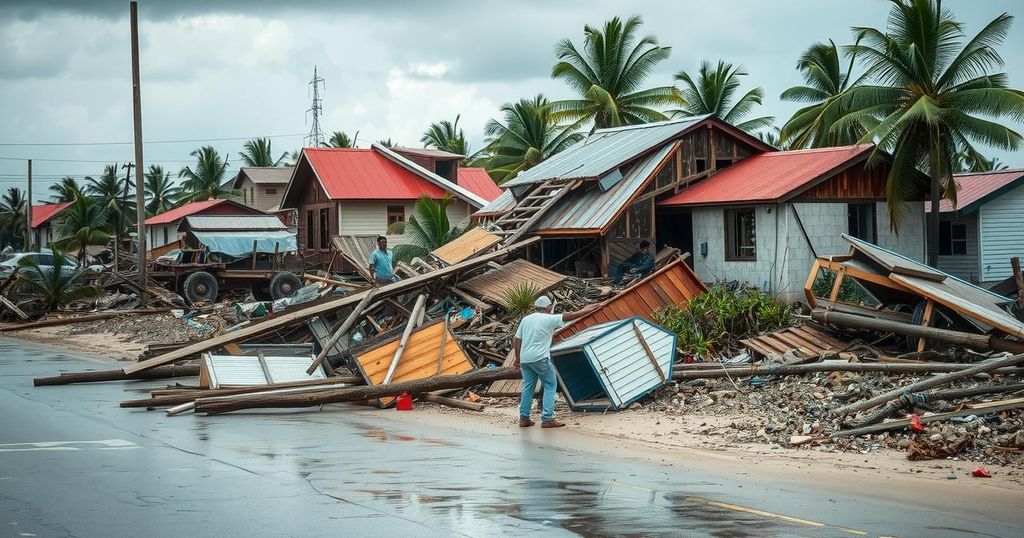Cyclone Chido has resulted in a severe humanitarian crisis in Mayotte and Mozambique, causing extensive damage and loss of life. With at least 120 fatalities in Mozambique and substantial destruction in Mayotte, urgent needs for food, water, and shelter are paramount. Organizations like HI are actively engaging in relief efforts to assist the displaced and affected populations, particularly in the hardest-hit areas.
The aftermath of Cyclone Chido, which struck Mayotte and Mozambique from December 14 to December 17, has resulted in a dire humanitarian crisis. With winds reaching 243 km/h, the cyclone caused extensive damage across Madagascar, Mayotte, the Comoros, northern Mozambique, and southern Malawi. The fallout has led to severe power, water, and communication outages, devastating hundreds of thousands of lives in the affected regions.
In Mozambique alone, the humanitarian toll is staggering, with at least 120 confirmed deaths as of December 23, as reported by the Disaster Management Institute of Southern Africa. The situation is equally grim in Mayotte, where the provisional death count stands at 35, with additional injuries reaching 2,500. The destruction of homes in both locations has left many families without shelter or basic necessities.
Kamar, an eight-year-old boy from Petite-Terre in Mayotte, poignantly expressed the devastation, stating, “My house was completely destroyed. We’ve lost everything. Everyone is sad. We need everything: food, water, clothes… electricity. I hope that everyone is safe, I hope that my school will be repaired and that there will never be another cyclone.”
In Mozambique, over 380,000 individuals have been affected, with a significant portion, including more than 90,000 children, living in Cabo Delgado. The Mecúfi and Metuge districts have experienced catastrophic destruction, leaving 16,000 families homeless, as articulated by Pauline Jacquart, the Mozambique program director for Humanitarian Inclusion (HI). Areas have witnessed almost total loss of housing, with urgent needs reported in shelter, cooking utensils, and mental health resources.
Claire, an emergency nurse in Mayotte, described the unprecedented impact of Cyclone Chido: “Nobody had ever seen or experienced anything like this before. Mayotte is a very green island, but here it was as if there’d been a huge fire and everything had been razed to the ground. It was as if everything had died.” Alongside her hospital responsibilities, she assists in shanty towns, where the recovery efforts are hampered by the sheer volume of debris and destruction present.
As the humanitarian situation continues to evolve, HI remains vigilant and engaged with local authorities, focusing on urgent assessments in the most affected regions, especially for vulnerable groups such as individuals with disabilities. Immediate assistance in food, water, and waste management remains essential as communities begin to recover from this tragedy.
Cyclone Chido has wreaked havoc across several regions in the southern Indian Ocean, impacting Mayotte and Mozambique significantly. As one of the year’s most ferocious storms, it has left behind an overwhelming humanitarian crisis characterized by loss of life, extensive property damage, and the urgent need for aid. The cyclone’s path of destruction includes Madagascar, Mayotte, the Comoros, and parts of northern Mozambique, with implications reaching into southern Malawi. The severity of Chido’s impact has been reported by local and international organizations, highlighting the need for humanitarian assistance to support the affected populations.
The destructive force of Cyclone Chido has resulted in substantial human suffering and infrastructural damage in Mayotte and Mozambique. The rising death toll and the growing number of affected individuals underline the urgent need for comprehensive humanitarian support. As organizations like HI mobilize their resources to aid in recovery efforts, the road ahead for the affected communities remains challenging but essential for rebuilding lives and infrastructure.
Original Source: reliefweb.int






